Deskripsi
Perkenalan
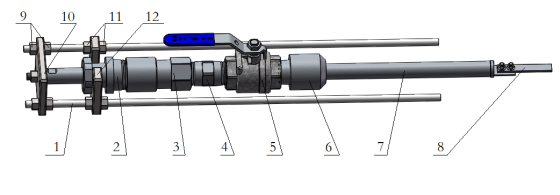
(Gambar satu)
Untuk pipa dengan tekanan desain yang lebih rendah dari 10 MPa, sistem kupon korosi yang dapat disesuaikan dilengkapi dengan alat instalasi dan penghapusan klem bergaya khusus, memungkinkan pembongkaran online. Sistem kupon korosi yang dapat ditarik EMT-RCC adalah alat serbaguna yang dapat menangani tekanan hingga 1500 psi (10,3 MPa) dan suhu setinggi 500 ℉/260 ℃. Ini berarti dapat bekerja secara efektif dalam kondisi sulit di saluran pipa. Kedalaman di mana probe kupon korosi dipasang dapat diubah berdasarkan diameter pipa dan ketebalan dinding. Ini memberi Anda fleksibilitas untuk menyesuaikannya agar sesuai dengan ukuran pipa yang berbeda. Panjang sistem standar kami adalah 24, 30, 36, 42, dan 48 inci. Kisaran ukuran ini membuatnya cocok untuk berbagai diameter pipa. Di akhir sistem, ada tempat untuk kupon korosi tipe strip yang terisolasi. Sistem ini dilengkapi dengan semua yang Anda butuhkan: batang probe, katup bola, kupon korosi, dan kit penjepit keselamatan yang dapat disesuaikan. Kami menyarankan menggunakan penjepit keselamatan jika tekanan dalam pipa kurang dari 1500 psi dan suhunya di bawah 500 ℉. Ini membantu menjaga keamanan selama operasi.
(Gambar 2)
Pemasangan awal kupon korosi yang dapat disesuaikan EMT-RCC
The product is transported as a whole when leaving the factory, with all components already assembled (including the welded base) and having passed a pressure test. Therefore, during installation, the user must unscrew and separate the welded base from the connection with the valve, weld it to the designated position on the pipe (pre-drilled diameter φ27~30mm), measure the distance L0 as shown in Figure 2, adjust the spacing L1 of the safety clamps (as shown in Figure 2), then install the corrosion coupon system onto the base, adjust the positioning distance L and the direction of the coupon, and tighten the upper and lower safety clamps. The installation is then complete. The specific steps are as follows:
(1) Persiapan sebelum instalasi
Buat lubang sekitar φ27 hingga 30 mm lebar di tempat yang direncanakan di pipa. Setelah Anda mengebor lubang, ratakan setiap tepi atau bit kasar yang tertinggal. Juga, pastikan untuk membersihkan karat apa pun dari area tempat Anda akan mengelas.
(2) Pemisahan dasar yang dilas
Lepaskan pangkalan yang dilas dari sistem kupon korosi, memisahkannya di persimpangan antara pangkalan yang dilas dan katup (antara item 5 dan 6 pada Gambar 1). Gunakan kunci pas untuk memperbaiki bodi katup dan kunci pas lain untuk membuka pangkalan yang dilas.
(3) Pengelasan dasar yang dilas (Butir 6 pada Gambar 1)
Sejajarkan alas yang dilas dengan lubang yang dibor (tegak lurus dengan pusat pipa dan dinding dan konsentris dengan lubang), lalu lepaskan ke pipa.
(4) Tentukan jarak pemasangan l
Setelah selesai mengelas pangkalan, Anda harus mengukur jarak maksimum dari bagian atas dasar yang dilas ke bagian dalam pipa. Gunakan batang probe untuk ini atau ukur secara langsung. Saat mengukur, pastikan batang probe berdiri pada sudut kanan ke tengah pipa dan dinding bagian dalam. Ini adalah jarak yang diberi label sebagai L0 pada Gambar 2. Selanjutnya, hitung jarak penentuan posisi, L, dengan mengurangi 10 mm dari L0. Akibatnya, L = L0 minus 10 mm. Tuliskan jarak pemosisian ini dan jaga agar tetap aman. Anda akan memerlukan informasi ini saat Anda menginstal dan memelihara kupon di masa mendatang.
(5) Sesuaikan jarak penjepit keselamatan
Pertama, tweak mur pengunci pada penjepit keselamatan yang lebih rendah. Kemudian, mengacu pada jarak 5-7mm yang ditunjukkan pada Gambar 2, kencangkan dua baut ke penjepit pengaman yang lebih rendah.
Selanjutnya, sesuaikan mur di kedua sisi penjepit keselamatan atas. Ini akan mengubah kesenjangan antara dua klem keselamatan. Anda bertujuan untuk jarak 90-95 mm, yang ditampilkan sebagai L1 pada Gambar 2.
Setelah Anda melakukan penyesuaian ini, perakitan Anda siap untuk digunakan.
(6) Pasang bahan penyegelan
Lepaskan bahan penyegelan yang tersisa dari permukaan benang katup dan benang dasar yang dilas. Tulis ulang bahan penyegelan pada benang eksternal katup.
(7) Pasang sistem kupon korosi
Hubungkan sistem kupon korosi dengan basis yang dilas (ini membutuhkan dua orang). Pastikan benang disejajarkan dan disekrup, putar sistem kupon korosi sampai tidak dapat bergerak, dan kemudian kencangkan katup dengan kunci pas.
(8) Sesuaikan kupon korosi ke posisi instalasi terakhirnya
Berdasarkan jarak L yang dihitung pada langkah (4) dari bagian ini, sesuaikan jarak antara penjepit pengaman atas dan permukaan datar dari dasar yang dilas ke jarak pemosisian L (ketika jarak antara penjepit keselamatan atas dan permukaan datar dari dasar yang dilas lebih besar dari L0, penjepit keselamatan atas harus disesuaikan ke bawah dengan sama dengan jarak L). Ini adalah jarak minimum, yaitu, kedalaman maksimum kupon korosi ke dalam pipa. Ini memastikan bahwa setelah sistem kupon dipasang di pangkalan, ujung bawah kupon korosi dekat dengan bagian bawah pipa sambil mempertahankan jarak yang aman.
(9) Sesuaikan arah kupon korosi
Gunakan kunci pas untuk menyesuaikan arah permukaan indikator kupon korosi (Gambar 3) di bagian atas batang pendukung kupon, memastikan bahwa permukaan indikator menghadap arah aliran medium di dalam pipa. (Pada titik ini, arah lebar kupon korosi sejajar dengan arah pipa.)
(10) Kencangkan mur penyesuaian penjepit keselamatan atas; Periksa dan kencangkan mur pengunci dari penjepit keselamatan yang lebih rendah. Instalasi selesai.
(Gambar 3)
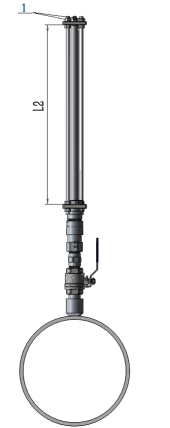
(Gambar 4)
Inspeksi Pembongkaran dan Pemeliharaan Sistem Kupon Korosi yang Dapat Disesuaikan EMT-RCC
Saat membongkar sistem kupon dari pipa untuk inspeksi pemeliharaan, ikuti langkah -langkah di bawah ini.
(1) Atur penjepit keselamatan atas ke posisi di mana katup ditutup.
Loosen the two nuts on the upper safety clamp, adjust the nuts to the distance L2 as shown in Figure 4, L2 = 515~525mm, then stop.
When there is pressure inside the pipe, the corrosion probe support rod will be pushed upwards as the nuts are loosened. If the coupon support rod does not pop up as the nuts are loosened, check by twisting the coupon support rod to see if it is jammed, to prevent a sudden burst under internal pressure, causing injury.
Note: Two people can operate simultaneously to unscrew the nuts, or one person can unscrew the two nuts alternately (alternate operation every 1 to 2 turns).
Under the pressure inside the pipe, the corrosion coupon support rod should be able to pop out as the nuts are loosened. If it doesn’t pop out, check and handle it promptly to ensure safe operation.
(2) Close the valve.
Rotate the valve handle to the closed state.
Note: Before closing the valve, you must confirm the distance L2, L2=515~525mm, to prevent the valve from being affected by a small L2 distance or causing damage to internal parts.
(3) Disassemble the sealing nut of the coupon system.
Perbaiki pipa cabang (No. 4 pada Gambar 1) di bagian atas katup dengan kunci pas. Gunakan kunci pas lain untuk memutar mur penyegel berlawanan arah jarum jam. Setelah dilonggarkan, gunakan tangan Anda untuk memutarnya, pisahkan mur penyegel dan bagian -bagian di atasnya secara keseluruhan, dan letakkan dengan aman.
(Catatan: Operasi ini membutuhkan dua orang.)
Dengan operasi ini, sistem kupon dapat dilepas dari dasar yang dilas dan pipa, dan pekerjaan pembongkaran selesai.
(4) Pembongkaran Kupon Korosi
Ketika perlu untuk membongkar kupon korosi, Anda harus menyesuaikan mur pada penjepit keselamatan atas perangkat kupon korosi, mengurangi jarak antara dua klem pengaman, sampai kupon korosi dan mur yang memperbaiki kupon korosi sepenuhnya memanjang dari mur sealing. Panjang ekstensi harus cukup untuk memfasilitasi pembongkaran mur yang memperbaiki kupon korosi. Lihat Negara pada Gambar 5.
Lepaskan mur yang memperbaiki kupon korosi, lepaskan kupon korosi, dan lakukan inspeksi atau penggantian berikutnya.
- Penjepit Pengaman Atas
- Kacang Penyesuaian
- Penjepit Pengaman Bawah
- Mur pengunci (terkunci selama penyesuaian)
- Kacang penetapan kupon korosi
(Gambar 5)
Parameter
| Membentuk | mengupas |
| Ukuran | 3 ″ x 1/2 ″ x 1/16 ″ (7,6 cm x 1,3 cm x 0,16 cm) |
| Lubang pemasangan | 2 holes |
| surface area | 3.4 in² (21.9 cm²) |
Furthermore, the specifications of the corrosion coupons can be tailored to meet the use of the user. Besides the strip shape, we also provide the circular type and other special types.
Components of EMT Adjustable Corrosion Coupons
- Safety Clamp Assembly
- Lock Nut
- Sealing Nut
- Pipa Sambungan
- Katup Bola Bor Penuh
- Basis Dilas
- Batang Pemasangan Kupon
- Kupon Korosi
- Kacang Penyesuaian
- Penjepit Pengaman Atas
- Kacang Pengunci
Reinstallation of EMT-RCC Adjustable Corrosion Coupons
Setelah penggantian kupon korosi selesai atau diinstal ulang setelah pekerjaan inspeksi, lanjutkan dengan instalasi ulang perangkat kupon.
(1)Confirm whether the adjustment rod is adjusted in place.
Measure and adjust the distance between the two safety clamps (important), it should meet L2=515~525mm in Figure 4. If it does not meet this criterion, adjustments should be made to this range. (Note: Keep the lower safety clamp stationary during the adjustment process, only adjust the upper safety clamp during the adjustment process.)
(2) Ganti bahan penyegelan.
Bersihkan bahan penyegelan residu di benang pipa cabang dan mur penyegel, dan bungkus bahan penyegelan baru di benang pipa cabang.
(3) Instal perangkat kupon.
Sejajarkan perangkat kupon dengan benang pipa cabang, ketat dengan tangan sampai tidak bergerak, lalu gunakan kunci pas untuk mengencangkan mur penyegel.
(4) Buka katup.
Setelah membuka katup, periksa apakah ada kebocoran di koneksi pipa cabang dan koneksi berulir lainnya. Jika ada kebocoran, tutup katup, maka berurusan dengan segel bocor (ganti bahan penyegelan atau ganti bagian, pertahankan dan instal ulang). Jika masih ada kebocoran, ulangi langkah ini sampai tidak ada kebocoran.
(5) Sesuaikan penjepit keselamatan atas ke posisi instalasi awalnya.
Sesuaikan mur penyesuaian yang lebih rendah dari penjepit keselamatan atas ke posisi terendah, dan segera sesuaikan mur ini ketika mempengaruhi penyesuaian mur penyesuaian atas.
Sesuaikan jarak antara penjepit keselamatan atas dan permukaan dasar yang dilas ke jarak rekaman instalasi awal L, lihat langkah (4) dari instalasi awal.
Saat menyesuaikan mur, satu orang dapat beroperasi secara bergantian untuk mengencangkan kedua mur; atau dua orang secara bersamaan dapat mengencangkan kedua kacang, berusaha menjaga penjepit keselamatan atas tegak lurus terhadap batang pendukung kupon untuk menghindari kemiringan yang berlebihan.
(6) Kunci batang pendukung kupon.
Setelah klem keselamatan atas disesuaikan di tempat, periksa arah batang pendukung kupon, putar batang pendukung kupon sehingga permukaan indikator (Gambar 3) titik ke arah aliran media pipa.
Kencangkan mur penyesuaian atas dan bawah dari penjepit keselamatan atas, periksa dan kencangkan mur kunci klem keselamatan bawah. Instalasi selesai.
Dengan ini, proses pemasangan kembali berakhir.

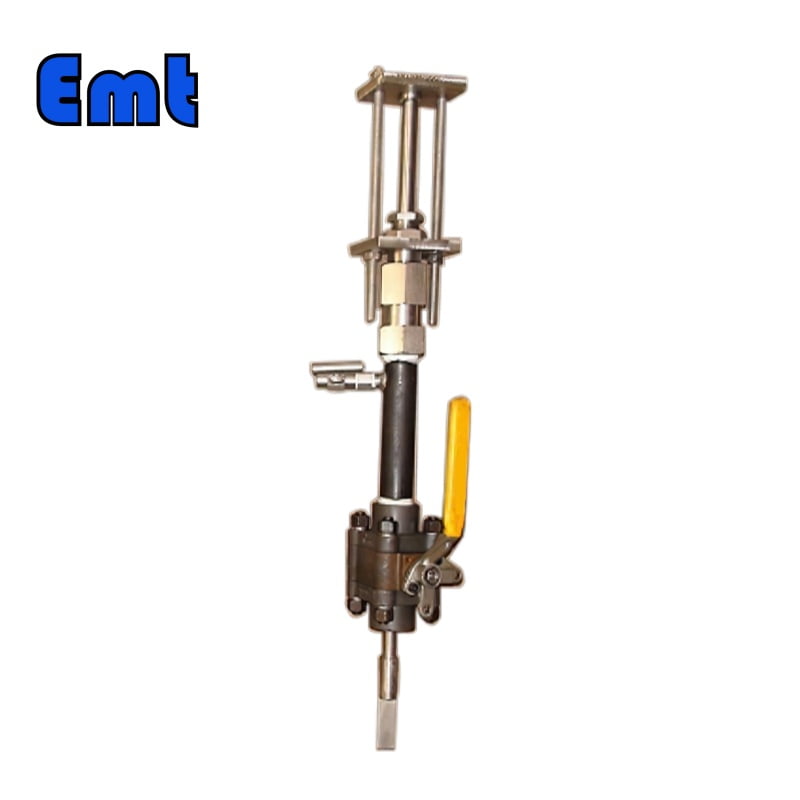
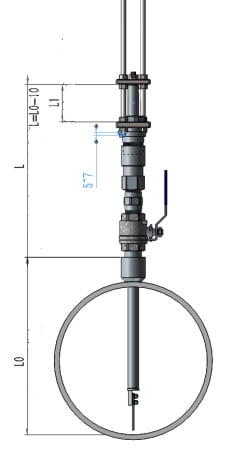
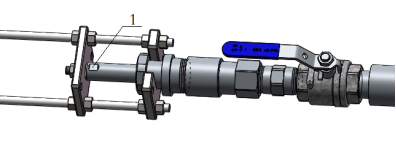
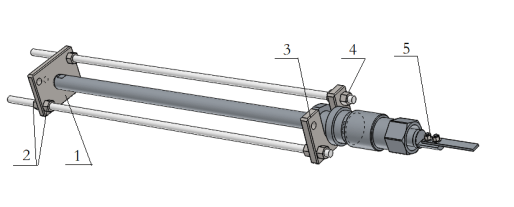
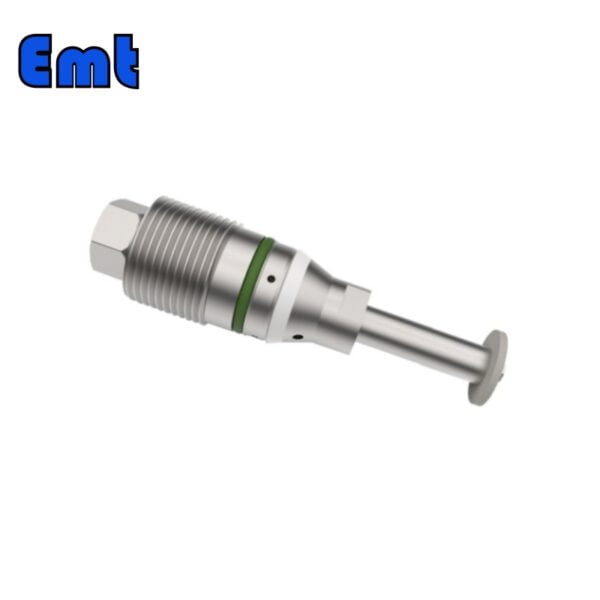
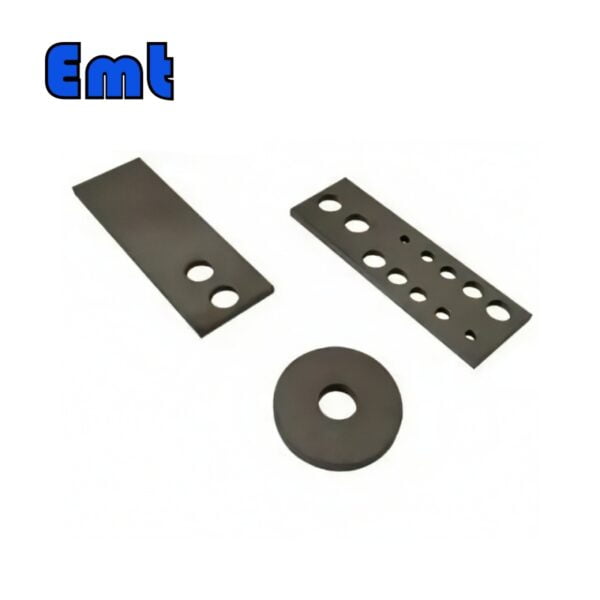
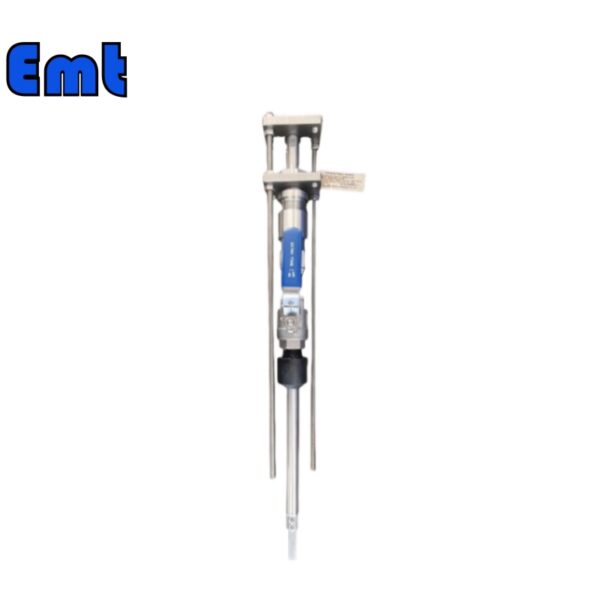
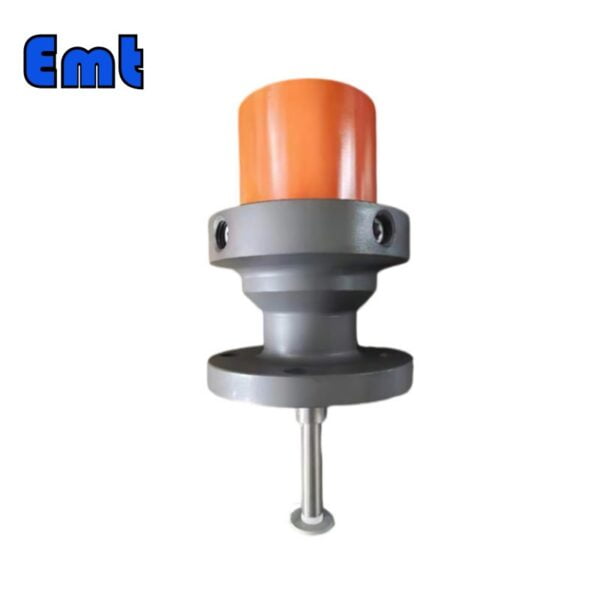
Lvivforum.pp.ua –
Ini adalah halaman web RIHT untuk siapa saja yang melangkah untuk mengetahui topik ini.
Anda memahami banyak hal yang hampir sulit untuk berdebat dengan Anda (bukan itu saya
Benar -benar perlu ... haha). Anda benar -benar menempatkan putaran neew pada topik yang memiliki
telah dibahas sejak lama. Barang indah, adil
Besar! https://Lvivforum.Pp.ua/